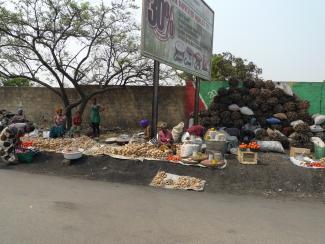Research
Give youth a chance

For several reasons, youngsters often find it particularly hard to find gainful employment. Many of them have not finished school, vocational training is hard to get, and young people have no work experience. In rural areas, moreover, malnutrition is common, and it affects the learning ability and development of children.
These problems mark Zambia’s labour market for instance. Among those aged 20 to 24, the unemployment rate in urban Zambia is 40 % for women and almost 36 % for men. The youth unemployment rate exceeds the one for adults five times. The statistic was compiled by the Zambia Institute for Policy Analysis and Research (ZIPAR) on behalf of the national government.
ZIPAR researches consider youth unemployment alarming in the cities. In comparison, rural data may seem less dramatic. In truth, however, the situation is desperate there too, because many young people work in the informal sector and hardly earn money.
Zambian employment obstacles
A ZIPAR survey among 92 Zambian private-sector companies revealed why businesses do not hire more youngsters. The main reasons are the lack of professional skills and work experience. Poor work ethics, the high costs of on-the-job training, high taxes and energy costs were also mentioned however.
ZIPAR’s advice to the government is to take account of employers’ needs and improve schools and vocational-training opportunities. School enrolment, according to ZIPAR, should be free of charge, but compulsory up to grade 12. ZIPAR was one of the hosts of this year’s PEGNet conference. PEGNet stands for Poverty Reduction, Equity and Growth Network. It spans the world and was initially started by academic institutes in Germany. The annual conferences are supported by Germany’s Federal Ministry for Economic Cooperation and Development (BMZ).
Many developing countries lack enough private-sector enterprises to provide all young people with job opportunities. Many must opt for self-employment. Young entrepreneurs, however, face a host of challenges. They typically do not have access to financial services and do not get any other kind of support either.
To rise to these challenges, Uganda established the Youth Venture Capital Fund (UYVCF) in 2011. Scholars from the Kampala-based Economic Policy Research Centre (EPRC) have assessed the Fund’s work. The UYVCF charges lower interest rates for micro credits that are below the market standard (15 % rather than 23 %), and offers other services too. Entrepreneurs from the age of 18 to 35 are eligible for loans. On the other hand, the UYVCF used more than a third of its money to help the city of Kampala set up markets, so young entrepreneurs can sell their goods.
The UYVCF was supposed to serve the entire country, but according to Gemma Ahaibwe of the EPRC, mostly enterprises in the Kampala agglomeration have benefitted. She points out, moreover, that the age group 26 to 35 has benefitted in particular. The reason is that younger proponents often do not fulfill all disbursement criteria and tend to have less promising business ideas.
The EPRC study shows that, while the new microbusiness normally provide a livelihood to the entrepreneurs, they hardly hire any additional staff. That had been hoped initially, and the UYVCF has clearly failed in this regard. Nonetheless, the EPRC team assesses its mix of financial and non-financial support favourably.
In southern Africa, entrepreneurs are increasingly starting non-farm businesses in rural areas. These companies already make up more than 50 % of registered formal-sector businesses in some places according to World Bank data for six countries. Paula Nagler from the UN University in Maastricht is doing research on the age of their staff. She discovered that experienced adults are more likely to start an enterprise than young people, and that they normally also make more money. Businesses that are established by young entrepreneurs tend to be less productive, she says. Her conclusion is that support for young entrepreneurs must be designed to suit their particular needs.
Pan-African prospect
Henri-Bernard Solignac-Lecomte of the Organisation for Economic Cooperation and Development (OECD) says that Africa can achieve progress as its economy is resilient and can cope with shocks. He bases his assessment on the African Economic Outlook 2014, which was recently published by the OECD, the UN Development Programme (UNDP) and the African Development Bank (AfDB). According to the document, pan-African economic growth will amount to 4.8 % this year and may well climb to six per cent next year. It is said to be driven by domestic demand, increasing exports and improving infrastructure. The authors note, however, that Africa could – and should – play a greater role in regional and international value chains. For this purpose, African countries should diversify industries, mobilise domestic resources and invest in infrastructure. The share of commodities in African exports is still said to be too large.
Solignac-Lecomte, the OECD scholar, said during the PEGNet conference that Africa can escape the resource trap if governments act prudently. Schools and vocational training are of particular relevance in this context.
Sabine Balk
PEGNet annual conference 2014:
http://www.pegnet.ifw-kiel.de/event/conferences/conference2014/program-2014
African Economic Outlook 2014:
http://www.africaneconomicoutlook.org













